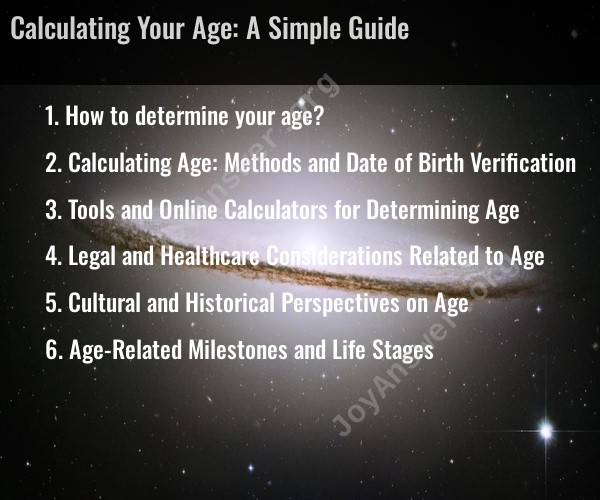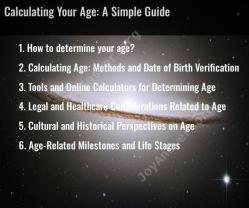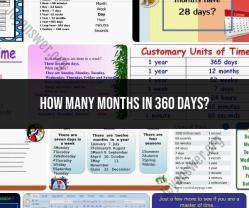How to determine your age?
Determining your age is a simple process. You can calculate your age by subtracting your birthdate from the current date. Here's a step-by-step guide:
Step 1: Find your birthdate.
- You'll need to know the date you were born. This includes the day, month, and year.
Step 2: Find the current date.
- Look at a calendar or check the date on your computer or smartphone to find the current date. This also includes the day, month, and year.
Step 3: Calculate the age.
- Subtract your birthdate from the current date. Pay attention to the year, month, and day differences.
For example, if you were born on February 10, 1990, and the current date is November 4, 2023:
- Calculate the year difference: 2023 (current year) - 1990 (birth year) = 33 years.
- Calculate the month difference: 11 (current month) - 2 (birth month) = 9 months.
- Calculate the day difference: 4 (current day) - 10 (birth day) = -6 days. Since the current day is earlier in the month, you'll need to subtract 1 from the month difference (9) and add the days remaining in the month to get an accurate count. This makes the month difference 8 months and 25 days.
So, your age is 33 years, 8 months, and 25 days.
You can use this method to calculate your age accurately. It's important to account for month and day differences to get the most precise age calculation, especially if your birthday is approaching in the current year.
Calculating Age: Methods and Date of Birth Verification
There are two main methods for calculating age:
- Chronological age: Chronological age is the time that has elapsed since a person's birth. It is calculated by subtracting the date of birth from the current date.
- Developmental age: Developmental age is a measure of a person's physical, cognitive, and social-emotional development. It is not calculated using a specific formula, but rather by observing a person's development and comparing it to other people of the same age.
Date of birth verification is important for a variety of reasons, such as obtaining a driver's license, applying for a job, or voting. There are a number of different documents that can be used to verify date of birth, such as a birth certificate, passport, or driver's license.
Tools and Online Calculators for Determining Age
There are a number of different tools and online calculators that can be used to determine age. These tools can be helpful for calculating chronological age, developmental age, or both.
Some popular online age calculators include:
- Age Calculator by Calculator.net
- Age Calculator by Time and Date
- Age Calculator by Omni Calculator
Legal and Healthcare Considerations Related to Age
There are a number of legal and healthcare considerations related to age. For example, in most countries, there is a minimum age requirement for obtaining a driver's license, voting, and drinking alcohol. There are also age requirements for certain healthcare procedures, such as getting a tattoo or piercing.
In addition, there are a number of age-related health conditions, such as Alzheimer's disease and Parkinson's disease. These conditions can impact a person's ability to live independently and may require additional care and support.
Cultural and Historical Perspectives on Age
Different cultures have different perspectives on age. In some cultures, older adults are revered for their wisdom and experience. In other cultures, age is seen as a sign of weakness or decline.
Historically, age has been used as a way to determine a person's status and social role. For example, in many societies, older adults were traditionally the leaders and decision-makers. However, this role has changed in recent decades as people are living longer and healthier lives.
Age-Related Milestones and Life Stages
There are a number of age-related milestones and life stages. Some common milestones include:
- Starting school
- Graduating from high school and college
- Getting married and having children
- Retiring from work
These milestones can mark major changes in a person's life. For example, starting school can be a time of excitement and anticipation, while retiring from work can be a time of reflection and transition.
Conclusion
Age is a complex concept with many different implications. It is important to understand the different ways that age is calculated and the different legal, healthcare, and cultural considerations related to age.




